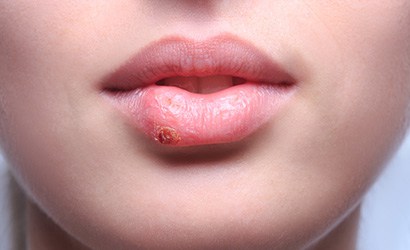Herpes is a virus known for 25 centuries and was so named by Hippocrates because it tends to “creep”. Indeed, when herpes infects one part of the body can then infect other, near or far, “creeping” from cell to cell.
The herpes virus is called HSV (Herpes Simplex Virus) and is a contagious disease. It is a family of viruses, with more than 150 strains. Humans are mainly affected by four strains: a) HSV1 (herpes type I) which causes cold sores, b) HSV2 (herpes type II) which usually causes genital herpes, c) Shingles, which in childhood causes chickenpox and d) Epstein-Barr virus, which causes infectious mononucleosis.
Cold sore is caused by recurrent herpes, which is a secondary manifestation of the herpes simplex virus. The virus is dormant in the epithelial cells of the oral mucosa, salivary glands and gastric ganglion. It is activated by various triggers, febrile diseases, allergies, mental and physical injuries, congelation, menstrual cycle, extreme weather conditions, ultraviolet radiation, etc. In these cases, the virulence of the virus is considered to increase and it exhibits pathogenic activity, due to a decrease in the body's resistance. When activated, it enters the saliva and as the mucous membranes of the mouth and lips are constantly wet with saliva, it can become infected with the virus.
A feature of the disease is that it does not leave immunity, which is why it often recurs for life because there is no definitive cure. Medications can simply reduce the symptoms and limit its repercussion.
Cold sores most often affect the 2nd and 3rd decade of life. It rarely occurs in newborns and infants. In terms of gender, women are affected more often than men.
Symptoms
The virus causes characteristic lesions. At first it causes a numbness and burning around the lips or inside the mouth. The skin reddens, swells and hurts. In fact, when the infection first appears, it is usually accompanied by pain, low-grade fever and swelling of the cervical lymph nodes in the throat. Gradually, blebs may appear, which clump together and rest on an erythematous base. The content of the blebs is clear at first, but then becomes nebulus, so they break and leave ulcers, which are covered by yellowish or brownish crusts. The virus cycles for 7-10 days and then heals, leaving no scar, except in rare cases where the herpes appears several times in the same place.
In general, cold sores are a mild disease that usually has no serious complications. But you need to pay attention to hygiene issues, so as not to cause contamination in another part of the body. We must wash our hands before and after any contact with the affected area. Improper hygiene can contaminate fingers, genitals or eyes.
Infection of the eyes is a very serious event, because it can cause permanent reduction of vision. It should be emphasized that we should not scratch the skin wounds of cold sores, because we can infect our fingers with the virus and the cold sores area with other germs. Also, women should not use makeup products on their lips or face.
Transmission
The transmission of cold sores from person to person is mainly when its symptoms are exacerbated and there are lesions in the form of blebs, but there can be transmission of the virus even when there are no symptoms. Its transmission is done through direct contact and mainly with the kiss. It can also be transmitted by glass, sheets, towels, etc. Airborne transmission can not be completely ruled out, but it is considered unlikely because herpes can not live long outside the cell.
Treatment
The virus is confirmed by a blood test to detect antibodies to the virus. Topical antiseptics are administered and the body is stimulated with vitamins C and B complex. In persistent conditions, analgesics, antibiotics, as well as 0.1% iodized pyrimidine solution or ointment are applied three times a day. When the recurrences are many, it is recommended to take daily antiviral treatment for a long time. The composition of antiviral drugs includes the active substances acyclovir, famciclovir and valaciclovir.
In any case, we must quit smoking and not be exposed to too much sun.
Source: http://blog.doctoranytime.gr/
 English
English  Ελληνικά
Ελληνικά 
